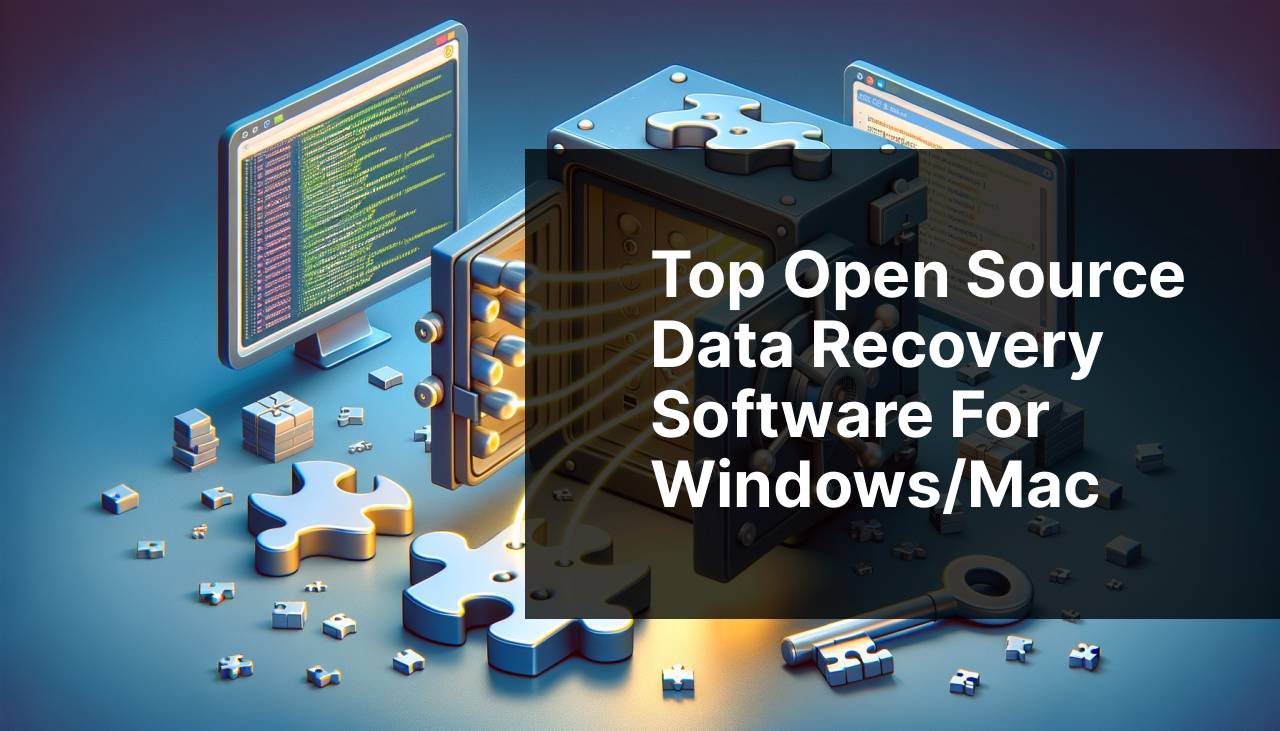Top Open Source Data Recovery Software for Windows/Mac

There’s nothing quite as heart-dropping as the moment you realize you’ve lost critical data. Whether it’s cherished family photos, an important work document, or a school thesis, the digital data we accumulate can be crucial and emotionally significant. Fortunately, open-source data recovery software can be a lifesaver in these circumstances. Having personally navigated the choppy waters of data loss, I’ve turned to several open-source tools to recover my precious files. Below, I’ll share my experiences with some of the best options out there, their strengths and weaknesses, and how they may help you in your time of digital need.
TestDisk
![]()
TestDisk is a powerhouse when it comes to recovering lost partitions and making non-booting disks bootable again. The tool is superb for addressing serious issues like the recovery of lost partitions, as I have personally experienced with a misplaced partition during a dual-boot setup.
Pros
- Can recover lost partitions and fix partition tables
- Supports a wide range of filesystems including FAT, NTFS, exFAT, and Linux filesystems
Cons
- User interface is not the most intuitive, especially for beginners
- Lacks a graphical user interface, operates entirely in a command-line environment
PhotoRec
![]()
Developed by the creators of TestDisk, PhotoRec specializes in the recovery of photos, videos, documents, and archives from hard disks, CD-ROMs, and lost pictures from camera memory. I’ve effectively used it to salvage multimedia files from a corrupted SD card—a true lifesaver for any digital photographer.
Pros
- Excels in recovering multimedia content
- Usable across various operating systems including Windows, Linux, and macOS
Cons
- Like TestDisk, operates via command-line which can be daunting
- The file recovery process might not retain original filenames
GNU ddrescue
![]()
GNU ddrescue is a data recovery tool that copies data from one file or block device to another, working to salvage information from failing drives. It’s perfect for those challenging situations where a disk’s integrity is compromised. I used ddrescue once to clone a failing hard drive, and it was instrumental in avoiding further data loss.
Pros
- Capable of recovering data from damaged disks
- Provides a log file for detailed analysis of the recovery process
Cons
- Requires knowledge of command-line tools
- Can be slow depending on the state of the disk
Foremost
![]()
Foremost stands as a forensic program to recover lost files based on their headers, footers, and internal data structures. This open source tool emerged from a digital forensics requirement and can scrape through a drive for remnants of files. I stumbled upon Foremost when I needed to dig deep into a friend’s reformatted drive—and it did not disappoint.
Pros
- Efficient in recovering data from formatted drives
- Runs on multiple platforms
Cons
- Primarily command-line, which may not be suitable for everyone
- Recovery process can be hit-or-miss depending on file fragmentation
extundelete
![]()
extundelete is a specialized data recovery tool that works specifically with ext3 and ext4 Linux filesystems. Having once dabbled with Linux servers, extundelete has come to my rescue after accidentally deleting critical log files. It’s simple, but it performs the job elegantly when dealing with these specific filesystems.
Pros
- Great choice for Linux ext3/ext4 filesystems
- Can recover files including their original filenames
Cons
- Only supports Linux ext3 and ext4—not versatile for other filesystem types
- Interaction is through the command-line interface
Conclusion:
In this era where our lives are increasingly digital, protecting our data is paramount. I’ve learned that while open-source data recovery software is immensely useful, it’s not a substitute for good data management habits. Website like Backblaze offer insights into comprehensive backup strategies, and forums like Reddit’s r/datarecovery can be great resources for learning from others’ experiences.
Furthermore, resources like Digital Guardian provide a wealth of best practices to prevent data loss. They stress the importance of anticipating data loss scenarios and preparing for them ahead of time.
From my experience, combining tools like the ones mentioned above with consistent backups and responsible data management, you can safeguard your digital legacy effectively.
FAQ
What are the core features of open-source data recovery software?
Open-source data recovery software usually offers file recovery across various file systems, raw recovery, disk imaging, and sometimes partition recovery. They are community-supported and often updated.
Can open-source data recovery software be trusted for sensitive data?
Yes, many open-source data recovery tools are reliable and secure for recovering sensitive data, as their source code is peer-reviewed by the community for any vulnerabilities or issues.
Is there a popular open-source data recovery tool for Windows?
Recuva, though not fully open-source, offers a free version suitable for Windows. For a dedicated open-source tool, try TestDisk, which works across platforms.
Which open-source software is recommended for recovering deleted partitions?
TestDisk is highly recommended for recovering deleted partitions. It's a powerful open-source tool that can also rebuild boot sectors and recover lost tables.
How user-friendly is open-source data recovery software typically?
Open-source data recovery software varies in user friendliness, with some offering graphical interfaces like PhotoRec, while others operate via command-line, such as ddrescue.
Are there any notable open-source data recovery projects for Mac users?
Mac users can utilize PhotoRec or TestDisk for their recovery needs. These tools are compatible with macOS and offer comprehensive data recovery options.
What support options are available for open-source data recovery tools?
Support for open-source tools usually comes from community forums or documentation. Some projects also offer mailing lists or IRC channels for direct assistance.
How does open-source data recovery software handle failing hard drives?
Tools like ddrescue are designed to recover data from failing hard drives by cloning data to a safe medium with minimal risk of further damage.
Can open-source data recovery tools recover data from SSDs?
Yes, most open-source data recovery tools, such as TestDisk and PhotoRec, can recover data from SSDs as well as traditional hard drives.
Is there a Linux-specific open-source data recovery tool?
Linux users often turn to extundelete for recovering files from EXT file systems. However, TestDisk and PhotoRec are also compatible with Linux.
 ping.fm
ping.fm 